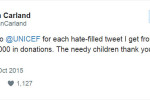This was written by Pedestrian and originally appeared at her blog.
When you come from a broken home, it’s tough to talk about your past – or present.
How much do you let out? How much does the world need to know?
I couldn’t help ponder the issue over and over as I was watching clips from The Stoning of Soraya M. on YouTube.
At surface level, it sounds simple. Before we solve age old questions about the questions of religion and state, velayat-e faghih, the right of inheritance, etc, etc, we need to act now. It may take decades for us to solve these dilemmas, but we need short term solutions for people who are suffering today.
One such horror is too many.
And yet, it is not representative of an entire population. It is a symptom, a disease that needs dire attention. Even if there was one such incident every year, it would resonate with so many of us because it is done under sharia law. There is support for it. That is what makes it so different than other forms of brutal domestic violence around the world.
And yet, how do we act? And what do we do?
Take Ms. Nazanin Afshin-Jam who takes credit for influencing the state of child executions in Iran. The truth is that Ms. Afshin-Jam has done nothing, has zero influence and is absolutely devoid of the least bit of credibility inside Iran. She is as unknown and uncared for as Ellen De Generes or Lauren Conrad (possibly less so because as I hear, The Hills is pretty popular in Iran). By going on CNN and taking credit for work she hasn’t done, she is only undermining the thousands of lawyers and activist in Iran who put their life on the line every single day just to make the smallest difference.
There are thousands of people out there, lawyers, journalists, activists, teachers, mothers who are putting themselves in harm’s way hoping that something different will eventually come out of this.
Why do we not hear their stories?
Why do we mostly hear the Azadeh Moavenis and Afshin-Jams of this world?
No, thousands of women are not being stoned to death everyday, but tens of thousands are being molested, raped and abused in much more subtle ways. Since we seem to love focusing on the negative alone, why not focus on them? The so called “ghanoon-e khanevade” (family legislation), which has been going in and out of parliament for the greater part of the last three years has received almost zero attention in media circles. That is what the everyday Iranian woman will worry about. That is what will undeniably affect millions of Iranian woman whose names we will never hear and whose stories we will most certainly forget.
But where are they in the news? On the movie screen? In The New York Times? Why are they missing?
Why not focus on all that these women have been able to achieve despite a myriad of dilemmas and obstacles?
I’ll tell you why: because on the surface, those stories are much less melodramatic. They make for far less entertaining sequences on prime time and public rallies.
…. But that is only one flip of the coin. The other is simply that if you come from a broken home too, quit fucking with me!
[The American] system that is accountable for some of the most violent atrocities in the past century has no right to criticize me on national television. Leave me to my own misery, and to my own ordeals.



